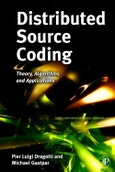The advent of wireless sensor technology and ad-hoc networks has made DSC a major field of interest. Edited and written by the leading players in the field, this book presents the latest theory, algorithms and applications, making it the definitive reference on DSC for systems designers and implementers, researchers, and graduate students.
This book gives a clear understanding of the performance limits of distributed source coders for specific classes of sources and presents the design and application of practical algorithms for realistic scenarios. Material covered includes the use of standard channel codes, such as LDPC and Turbo codes, to DSC, and discussion of the suitability of compressed sensing for distributed compression of sparse signals. Extensive applications are presented and include distributed video coding, microphone arrays and securing biometric data.
Please Note: This is an On Demand product, delivery may take up to 11 working days after payment has been received.
Table of Contents
Foundations of Distributed Source CodingDistributed transform coding
Quantization for Distributed Source Coding
Zero-error Distributed Source Coding
Distributed Coding of Sparse Signals
Towards constructive Slepian-Wolf coding schemes
Distributed Compression in Microphone Array
Distributed Video Coding: Basics, Codecs and Performance
Model Based Multi-view Video Compression using Distributed Source Coding Principles
Distributed Compression of Hyperspectral Imagery
Securing Biometric Data








